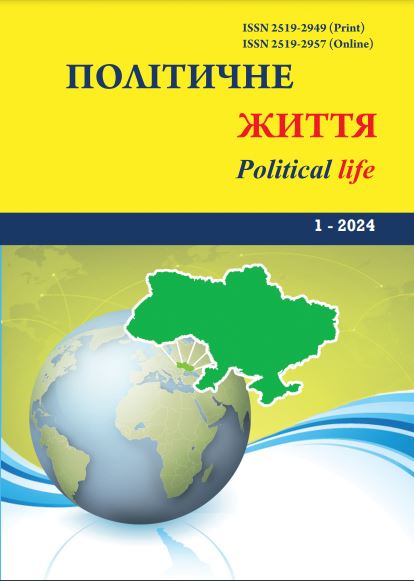Civil society of Ukraine and diaspora: cultural and educational priorities of preserving identity
DOI:
https://doi.org/10.31558/2519-2949.2024.1.18Keywords:
Ukraine; European Union; Poland; Germany; civil society; diaspora; culture; educationAbstract
The radical transformations that modern Ukrainian society is experiencing in the conditions of full-scale aggression of the Russian Federation against Ukraine and its acquisition of the status of a candidate for the EU require a proper, in-depth and comprehensive analysis of Ukraine’s humanitarian development strategies, the implementation of the European integration vector of its development, and the strengthening of the unity of the Ukrainian world.
Cultural and educational priorities for the establishment of Ukrainian identity, humanitarian strategies for the development of Ukraine in the context of full membership in the European Union are studied.
The practical conclusions regarding the optimization of Ukraine’s European integration strategy are as follows: substantiation of the importance of public initiatives for the establishment of European values in Ukraine: creation of a standard education system in Ukraine; modernization of worldview culture of Ukrainians; filling the educational subject material of secondary and higher education institutions with integrative systemic knowledge about the European integration strategy of Ukraine; formation of an empirical base for the scientific solution of the problems of geopolitics and globalism in the field of Ukrainian studies, social philosophy and philosophy of history; approval of the European paradigm for the protection of the rights and freedoms of citizens and the equality of all subjects of law before the law, etc.
The educational and cultural priorities of European integration require: the implementation of information and communication projects aimed at the development and provision of the national and cultural needs of Ukrainians abroad; informing the diaspora about current events in the social and cultural life of Ukraine; facilitating the establishment of contacts between scientific institutions, cultural institutions, creative collectives from different countries, which seek to maintain ties with Ukraine; creation of a network of Ukrainian information and cultural centers abroad – "Ukrainian houses".
Practical modes of educational and cultural integration of Ukraine into the EU require: the implementation of information and communication projects aimed at the development and provision of the national and cultural needs of Ukrainians abroad; informing the diaspora about current events in the social and cultural life of Ukraine; facilitating the establishment of contacts between scientific institutions, cultural institutions, creative collectives from different countries, which seek to maintain ties with Ukraine; creation of a network of Ukrainian information and cultural centers abroad under the banner of "Ukrainian cottages/homes".
References
Громадянське суспільство України: сучасні практики та виклики розвитку: аналітична доповідь / за заг. ред. О.А. Корнієвського, ЮА. Тищенко, В.М. Яблонського. Київ: НІСД, 2018. 128 с.
Імплементація Національної стратегії сприяння розвитку громадянського суспільства в Україні на 2016 – 2020 роки: Моніторингове дослідження. Київ: Офіс Ради Європи в Україні, 2019. 124 с.
Індекс сталості організацій громадянського суспільства в Україні зростає. URL: detector.media/infospace/article/182667/20-11-20-indeks-stalosti (дата звернення 20.11.2020).
Крисаченко В.С. Динаміка гуманітарних пріоритетів в політичному житті незалежної України: дилема намірів та дій. Українознавство. 2020. № 2 (75). С. 93 – 119.
Про історично населені українцями території Російської Федерації. УКАЗ ПРЕЗИДЕНТА УКРАЇНИ №17/2024. https://www.president.gov.ua/documents/172024-49513 (22.01.2024).

